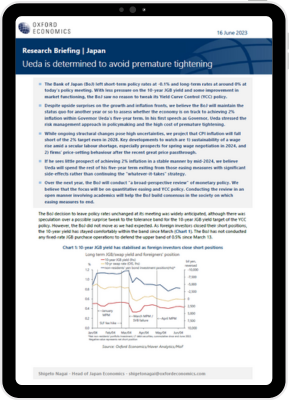Japan: Ueda is determined to avoid premature tightening

The Bank of Japan (BoJ) left short-term policy rates at -0.1% and long-term rates at around 0% at today’s policy meeting. With less pressure on the 10-year JGB yield and some improvement in market functioning, the BoJ saw no reason to tweak its Yield Curve Control (YCC) policy.
Despite upside surprises on the growth and inflation fronts, we believe the BoJ will maintain the status quo for another year or so to assess whether the economy is on track to achieving 2% inflation within Governor Ueda’s five-year term. In his first speech as Governor, Ueda stressed the risk management approach in policymaking and the high cost of premature tightening.
What you will learn:
- While ongoing structural changes pose high uncertainties, we project that CPI inflation will fall short of the 2% target even in 2028. Key developments to watch are 1) sustainability of a wage rise amid a secular labour shortage, especially prospects for spring wage negotiation in 2024, and 2) firms’ price-setting behaviour after the recent great price passthrough.
- If he sees little prospect of achieving 2% inflation in a stable manner by mid-2024, we believe Ueda will spend the rest of his five-year term exiting from those easing measures with significant side-effects rather than continuing the “whatever-it-takes” strategy.
- Over the next year, the BoJ will conduct “a broad-perspective review” of monetary policy. We believe that the focus will be on quantitative easing and YCC policy. Conducting the review in an open manner involving academics will help the BoJ build consensus in the society on which easing measures to end.
Tags:
Related posts

Post
How Asia’s supply chains are changing | Techonomics Talks
Global supply chains have continued to expand, despite talk of deglobalization and nearshoring. US and Japan have started to de-couple from China, but other G7 countries grow more dependent on Chinese inputs. Several "hotspots" are emerging across Asia with multiple winning formulas.
Find Out More
Post
BoJ to raise its policy rate cautiously to 1% by 2028
We now project that the Bank of Japan will start to raise its policy rate next spring assuming another robust wage settlement at the Spring Negotiation. If inflation remains on a path towards 2%, the BoJ will likely raise rates cautiously to a terminal rate of around 1% in 2028.
Find Out More
Post
Japan inflation to rise to 1.8%, but downside risks are high
Reflecting a surprisingly strong Spring Negotiation result and weaker yen assumption, we have upgraded our baseline wage and inflation forecasts. We now project higher wage settlements will push inflation towards 1.8% by 2027. Uncertainty is high, however.
Find Out More